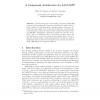106
click to vote
SPAA
2003
ACM
15 years 7 months ago
2003
ACM
In the classical load balancing or multiprocessor scheduling problem, we are given a sequence of jobs of varying sizes and are asked to assign each job to one of the m empty proce...
108
click to vote
SPAA
2003
ACM
15 years 7 months ago
2003
ACM
We consider an online version of the oblivious routing problem. Oblivious routing is the problem of picking a routing between each pair of nodes (or a set of ows), without knowled...
121
click to vote
SPAA
2003
ACM
15 years 7 months ago
2003
ACM
In the minimum path coloring problem, we are given a graph and a set of pairs of vertices of the graph and we are asked to connect the pairs by colored paths in such a way that pa...
SPAA
2003
ACM
15 years 7 months ago
2003
ACM
120
click to vote
SPAA
2003
ACM
15 years 7 months ago
2003
ACM
In this paper we consider the following scenario. A set of n jobs with different threads is being run concurrently. Each job has an associated weight, which gives the proportion ...
110
click to vote
PPOPP
2003
ACM
15 years 7 months ago
2003
ACM
To better manage the ever increasing complexity of LAM/MPI, we have created a lightweight component architecture for it that is specifically designed for high-performance message p...
107
click to vote
PPOPP
2003
ACM
15 years 7 months ago
2003
ACM
In this paper, we provide examples of how thread-level speculation (TLS) simplifies manual parallelization and enhances its performance. A number of techniques for manual parallel...
126
click to vote
PPOPP
2003
ACM
15 years 7 months ago
2003
ACM
We present a new method for dynamically detecting potential data races in multithreaded programs. Our method improves on the state of the art in accuracy, in usability, and in ove...
PPOPP
2003
ACM
15 years 7 months ago
2003
ACM
151
click to vote
PPOPP
2003
ACM
15 years 7 months ago
2003
ACM
A design pattern is a mechanism for encapsulating the knowledge of experienced designers into a re-usable artifact. Parallel design patterns reflect commonly occurring parallel co...



